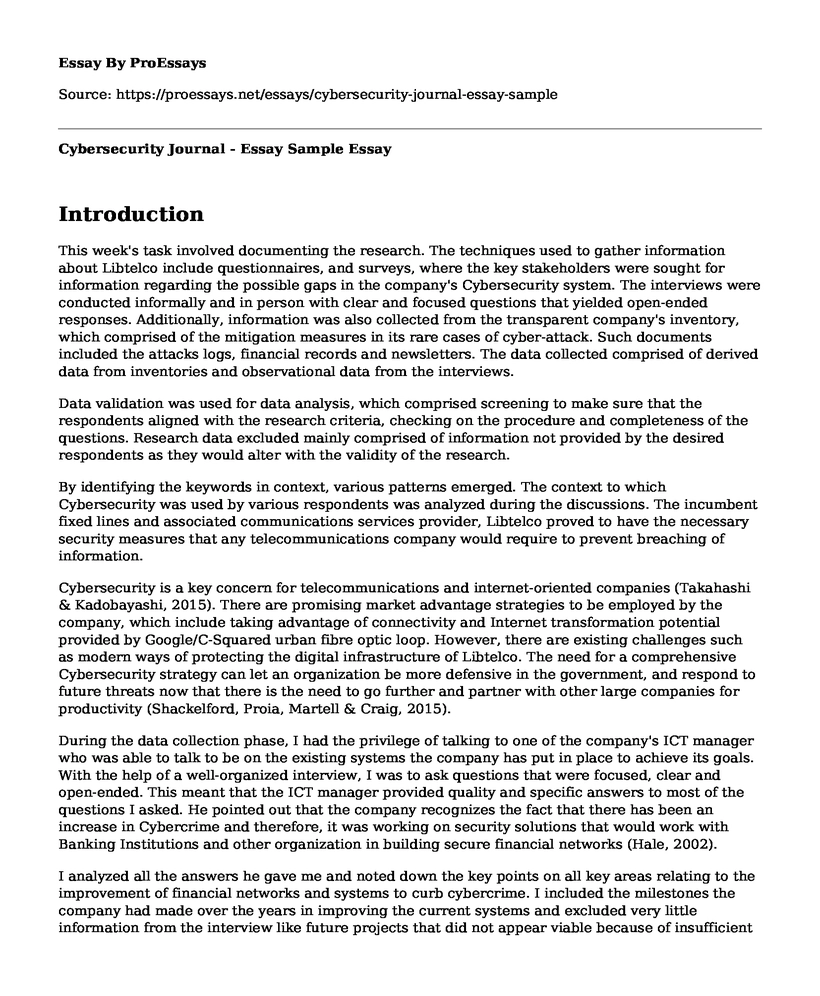Introduction
This week's task involved documenting the research. The techniques used to gather information about Libtelco include questionnaires, and surveys, where the key stakeholders were sought for information regarding the possible gaps in the company's Cybersecurity system. The interviews were conducted informally and in person with clear and focused questions that yielded open-ended responses. Additionally, information was also collected from the transparent company's inventory, which comprised of the mitigation measures in its rare cases of cyber-attack. Such documents included the attacks logs, financial records and newsletters. The data collected comprised of derived data from inventories and observational data from the interviews.
Data validation was used for data analysis, which comprised screening to make sure that the respondents aligned with the research criteria, checking on the procedure and completeness of the questions. Research data excluded mainly comprised of information not provided by the desired respondents as they would alter with the validity of the research.
By identifying the keywords in context, various patterns emerged. The context to which Cybersecurity was used by various respondents was analyzed during the discussions. The incumbent fixed lines and associated communications services provider, Libtelco proved to have the necessary security measures that any telecommunications company would require to prevent breaching of information.
Cybersecurity is a key concern for telecommunications and internet-oriented companies (Takahashi & Kadobayashi, 2015). There are promising market advantage strategies to be employed by the company, which include taking advantage of connectivity and Internet transformation potential provided by Google/C-Squared urban fibre optic loop. However, there are existing challenges such as modern ways of protecting the digital infrastructure of Libtelco. The need for a comprehensive Cybersecurity strategy can let an organization be more defensive in the government, and respond to future threats now that there is the need to go further and partner with other large companies for productivity (Shackelford, Proia, Martell & Craig, 2015).
During the data collection phase, I had the privilege of talking to one of the company's ICT manager who was able to talk to be on the existing systems the company has put in place to achieve its goals. With the help of a well-organized interview, I was to ask questions that were focused, clear and open-ended. This meant that the ICT manager provided quality and specific answers to most of the questions I asked. He pointed out that the company recognizes the fact that there has been an increase in Cybercrime and therefore, it was working on security solutions that would work with Banking Institutions and other organization in building secure financial networks (Hale, 2002).
I analyzed all the answers he gave me and noted down the key points on all key areas relating to the improvement of financial networks and systems to curb cybercrime. I included the milestones the company had made over the years in improving the current systems and excluded very little information from the interview like future projects that did not appear viable because of insufficient funding. Patterns of continued improvement in the system's security were evident as the company strives to keep up with advances in technology which has aided the increase in cybercrime sophistication (Quarshie & Martin-Odoom, 2012). The information gathered during the interview was added to previously submitted papers which was able to shed more light on ways of curbing financial cybercrimes.
References
Shackelford, S. J., Proia, A. A., Martell, B., & Craig, A. N. (2015). Toward a global cybersecurity standard of care: Exploring the implications of the 2014 NIST cybersecurity framework on shaping reasonable national and international cybersecurity practices. Tex. Intel LJ, 50, 305.
Takahashi, T., & Kadobayashi, Y. (2015). A reference ontology for cybersecurity operational information. The Computer Journal, 58(10), 2297-2312.
Cite this page
Cybersecurity Journal - Essay Sample . (2022, Dec 03). Retrieved from https://proessays.net/essays/cybersecurity-journal-essay-sample
If you are the original author of this essay and no longer wish to have it published on the ProEssays website, please click below to request its removal:
- Security of Web-Enabled Small Devices - Essay Example
- Essay Sample on Network Security
- Essay Sample on Economic Benefits of Cloud Computing
- Essay Sample on Careers and Certifications in Cybersecurity
- Essential SQL Tutorial for Technology & Data Management - Research Paper
- Essay Example on Data Center Risks: Identifying & Mitigating Negative Effects
- Dark Net: Anonymity, Whistleblowing, and Challenges - Essay Sample







